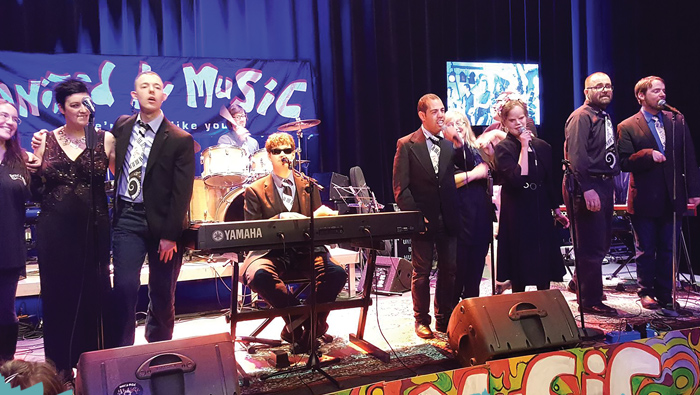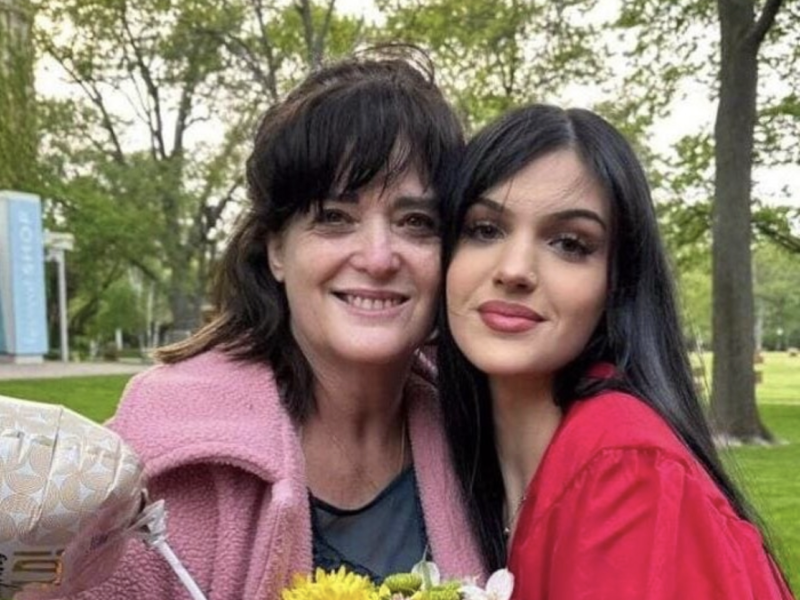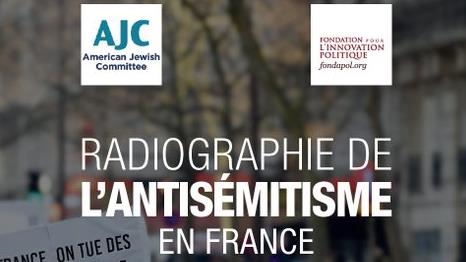
In concerts from Portland to Amsterdam, United by Music North America is healing the world one song at a time.
Founded in the Netherlands in 2005 to provide performance opportunities for musically talented people with developmental disabilities, United by Music expanded to North America in 2012. The nonprofit was founded here by a Jewish mother-daughter duo, who combined their expertise in the nonprofit and music worlds to launch a successful Portland-based band that is wowing audiences from Oregon’s Waterfront Blues Festival to gala concerts in the Netherlands.
“People with developmental issues are put in a box,” says Barbara Hammerman, who co-founded UBMNA with her daughter, Amanda Gresham. “Through blues music we offer them a chance to fly. … It blurs the lines between what is able and what is not.”
The goal of UBMNA is to give musically talented individuals, who self-identify as having special needs, the opportunity to perform at a professional level. Produced by Amanda, coached by mentors and guided by Music Director Dave Fleschner, the band has evolved into a professional troupe hired year-round to perform at festivals, venues and private events.
On stage, band members seem to step effortlessly outside of that box society seeks to confine them to. Listening to these talented adults on stage, it is suddenly easy to understand why the phrase “differently abled” is much more apt than the term “disabled.” Their strong, sure voices raised in song give no hint of the limits society assumes they face.
“It helps people and breaks barriers; imagine no barriers with gender or race or color or abilities,” says band member Wyatt Isaacs, one of two band members who recently participated in Birthright Israel. “I really enjoy it. I enjoy the good people and the social message; Amanda has done a great, great job.”
Wyatt also enjoyed his Israel experience last year. “It was really moving – an incredible experience,” he says with a smile. “Israel has a lot of deep, rich culture and the food was incredible.”
Jordan Ackerson, the other Birthright participant in the band, is an insightful young man if one takes the time to listen. Like many people with autism, he speaks hesitantly and often looks away. On the first day of summer, he wished me a good summer and spoke of the wild changes in weather from 100-plus temperatures to cold, rainy days. He had a point to make: “The weather is full of paradoxes, just like people.”
When he took the stage, the change in him made his point. Here is an engaging performer with a beautiful fluid voice, eyes seeking his audience, gestures as smooth and practiced as a rock star.
Another band member, David Hutzler, says he enjoys the people he’s met and the places he’s visited. As the third artist to join the band, he frequently attends outreach events to talk about the program and encourage people to support it. In late July and after the band’s performance, he staffed the UBMNA booth at the Cathedral Park Jazz Festival near the St. John’s Bridge. He talked to passersby about United by Music and encouraged them to make a donation to the program, showing them the CDs they could receive for various donation levels.
Last year he introduced his friend Bethany Ide to the band. Bethany had performed in the past with the choir Voices Unlimited, but enjoys the music and good friends she has found at UBMNA. “I’ve never sung blues before,” she says. “I’ve been singing as long as I can remember. I enjoy learning a new style of music.”
Even after four years of producing the band’s performances, Amanda says she is continually impressed by their brilliance and how quickly they learn. “I know how musically talented they are, and I am constantly re-astounded by their intuition and retention,” she says. “Their skills exceed expectations.”
Amanda’s vision to create a band performing at a professional level is brought to fruition by the music director. “Dave translates the ideas into music. I’ll have thoughts and he is able to organize them into cohesiveness.”
Dave, who has played in and directed dozens of bands, started at UBMNA as a mentor but soon expanded his role. “Dave actualizes my vision into reality by translating the goals into music and sharing it with the mentors and artists in the language they understand,” says Amanda. “Then we rehearse together till we are performance ready.”
Dave adds, “I took her (Amanda’s) vision for the artists to have a chance to perform at the same level as professionals. It takes rehearsal, practice and working parts out. … I’ve found they are just as capable as all the other artists I work with. I had my mind opened working with these artists.”
Barbara notes that while many of the band members had performed individually before, as band members they have had to learn to work with others and communicate and collaborate.
Now, Dave says, “I believe our show is as good, as entertaining as any show you’d see on stage.”
He’s not alone in that belief.
Two-time Grammy-nominated blues singer Earl Thomas (Bridgeman) has sung with the band at the Waterfront Blues Festival for the past two years. This year he performed with them on the Oregonian Front Porch Stage.
“They are good, they are so good I was brought to tears a couple times,” says Earl. “I play music all over the world, and this is my most rewarding musical experience. These kids are so real. They are so dedicated to the music.”
While initially the mentors performed alongside and nurtured the artists, Dave says that now the mentors often take more of a backup role in the band.
During a performance at the Rose Hotel during this year’s Blues Festival, a famous face was spotted playing backup guitar. Sonny Hess was the first woman nominated in a male-dominated field for best lead guitar by the Cascade Blues Association, where she has also been nominated for a lifetime achievement award. But she’s happy to drop in and perform with this talented group of artists.
“United by Music is transforming the lives of everybody involved – not just the artists. The mentors all say they have been enriched,” says Barbara.
Last year UBMNA launched its second band in the Puget Sound area, and Nashville musicians have expressed interest in bringing the program there.
In April Barbara and Amanda led 11 performers, three volunteers and eight parents to Europe to participate in the 10th Anniversary Jubilee Celebrations and Gala Concerts of United by Music in The Netherlands. The Portland band performed six concerts in eight days in Dordrecht/Sleidrecht.
“Our program is the first to be developed outside of the Netherlands,” says Barbara. “An important component to our trip, beyond the concerts, was that we all stayed in a village of vacation homes with all of our artists and their parents, as well as the performers from the Netherlands and a few from Norway and Denmark – countries which are attempting to start a United by Music program in their areas. With this sort of Olympic Village-style housing and many meals together, we were able to visit and have one or two jam sessions a day with people from these other countries. I believe the friendships made will last a lifetime in some cases.”
~~
But how did United by Music begin and how did Portland become home to the first branch outside of the Netherlands? And how did two Jewish women come to lead it?
An executive of a Dutch health-care organization that deals with people with developmental challenges, Joris Van Wijngaarden is a longtime blues fan who began booking American artists to perform at parties and events he hosted. One of those singers, Candye Kane (z”l), started to invite some of the people on stage to sing with her.
Barbara says that Candye and Joris were both amazed by two things. The singers spoke and sang in English, which Joris had no idea they knew, and they were extremely talented. That discovery prompted Joris to found United by Music in 2005 with the goal of giving people with disabilities the opportunity to soar and excel; by 2006 the first band began performances.
As a blues fan, Joris realized the American root music was an ideal fit to challenge assumptions. Historically, blues was the music of “chanceless populations,” says Joris. “We provide opportunities,” says Amanda, “when the world provides opportunities for them, good things can happen.”
Additionally, Dave says blues “comes out of despair and longing, but ultimately is uplifting in the artistry; singing helps transcend the sadness.”
When Joris wanted to expand the program to America, Candye told him he must talk to her good friend Barbara, president of Hammerman Philanthropic Partners, and her daughter, Amanda, CEO of Delta Music Experience.
Barbara has more than 30 years of experience working with nonprofit philanthropy, including 18 years with the Jewish Federation system. In the mid-1980s she was the founding executive of the Jewish Federation endowment program in Orange County, CA. That program became a pilot program for the national federation movement (now Jewish Federations of North America) to help small and mid-sized federations create an endowment program.
Amanda’s experience in producing blues music events dates to 2004 when she moved to New Orleans to create river cruises where musicians and fans would travel together for an intimate experience of sharing music, stories and meals. Having built a strong trust with blues musicians she had traveled with as a documentary photographer starting in 1999, Amanda was able to recruit some impressive participants on her cruises. The Delta Music Experience was just a year old when Hurricane Katrina forced her to evacuate New Orleans. Driving to Gig Harbor, WA, to stay with her parents, Raymond Lavine and Barbara, she stopped in Portland at a Blues for Katrina benefit concert. She returned to New Orleans a few months later and discovered the art gallery she owned there was not sustainable. She stayed until 2008, then decided to relocate her DME to a city “with a blues-loving community with riverboats” – in other words, Portland. She quickly became involved with the Waterfront Blues Festival and now produces the DME Blues Cruises and the DME Louisiana Pavilion at the festival. The pavilion is a destination attraction during the festival that creates “a village of Louisiana with Gulf Coast music.”
So in 2009 Joris flew to the states to meet the women. “He came for lunch and stayed for the day,” says Barbara. “I know music, festivals and nonprofits, but I don’t know about developmental issues.”
Over the next 18 months, the three laid the groundwork to bring UBM to America. Barbara reached out to her network to see if similar programs existed here (she couldn’t find any), and she and Amanda went to the Netherlands to see the program in action. Then Amanda and Joris planned a two-country, three-state, nine-city showcase tour of performers from the Netherlands.
“It was a 60-minute targeted performance – part performance and part talk,” says Barbara, adding that they invited about 400 people in each city to attend the 2010 showcase. “At the end, we asked people if they wanted to help start UBMNA and if they were willing to meet with us. All nine cities said yes.”
Each city created a team to explore the concept, and all agreed the program needed to launch in one city initially. Barbara says Portland was the unanimous choice as the pilot city “because of Amanda’s connections with the Waterfront Blues Festival, so they were a natural partner.”
In fact, UBMNA has had an ever expanding role at the festival, starting with participation in the Louisiana Pavilion and moving on to one of the main stages. Amanda says now she gets calls from her DME musicians asking to perform with the band or asking how they can be involved in this worthwhile project.
Amanda calls UBMNA a true family affair. Amanda’s DME is the presenting sponsor; Barbara is board president and director of UBMNA; and Amanda’s father, Raymond Lavine, sponsors musicians and hosts benefit concerts for the group at WurliTzer Manor in Gig Harbor.
Fundraising is an essential component of the program. While the national health care in the Netherlands helps support the parent program, in the United States such programs to improve quality of life are not covered by health insurance.
The performers’ parents are also vital to the program.
“The founders are important, but this is a team,” says Amanda. “This couldn’t happen without the involvement and support of the parents, the artists, the mentors and the festival bookers who are excited about bringing us to perform.”
“We are open for bookings year round,” says Amanda, who coordinates the band’s production schedule. “We exist to collaborate.”
And at most bookings you’ll hear the group’s theme song including the chorus:
Music brings us together
Anybody can sing along
We’re united by music
And we’re united in song
To volunteer, donate or book,
United by Music North America: UBMNA.org | 253-225-7655





